R1 Stage: Beginning Bloom
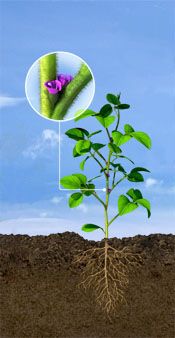
At least 1 flower appears on the plant on any node on the main stem. This is beginning bloom. The plant is at the V7 to V10 stage and typically is 15" to 18" tall. Flowering always begins on the 3rd to 6th node, depending on vegetative stage. Flowering progresses up the plant and the branches. In each raceme, the pods closest to the base are the most mature. Primary racemes (flower clusters) develop ahead of secondary racemes. Vertical roots grow rapidly and continue to R4 or R5. Secondary roots and root hairs also continue to grow.
Tips
Pests to Scout For:
R2 Stage: Full Flowering
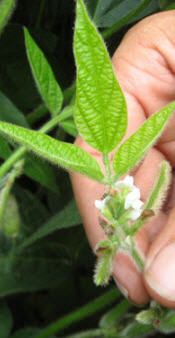
At the R2 stage, the plant is beginning full bloom. The appearance of flowers begins to slow. Nitrogen (N) fixation increases rapidly and nodulation is at maximum. Flowers at most nodes throughout the plant. In determinant types the top node should have nearly fully expanded trifoliate leaves. For indeterminant types the top nodes may have trifoliates and blooms developing concurrently at each node. Especially for indeterminant types there will be small pods forming at the lower nodes. The plant normally sets more blooms than it can fill and most nodes will have multiple flowers. As stresses occur over the next 2 weeks many of these will abort instead of developing viable pods.
Tips
Pests to Scout For:
R3 Stage: Beginning Pod Development
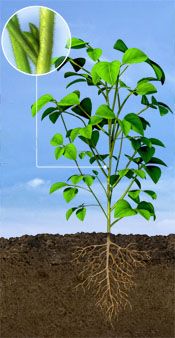
When 1 pod on 1 of the 4 upper nodes reaches 3/16" long, the plant is at R3. This usually occurs between V11 and V17. Plants are 23" to 32" tall. Typically, 60% to 75% of flowers abort, but stress can increase the loss. Temperature or moisture stress can limit pod numbers, beans per pod or bean size. Because of its long flowering period, the plant can compensate some for losses, but its ability to make up ground dwindles as it approaches R5.
Tips
Pests to Scout For:
R4 Stage: Full Pod
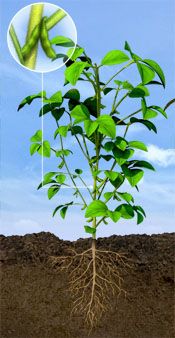
At R4, the plant reaches the full pod stage, pod growth is rapid and seed development begins. This is the most crucial stage for seed yield. In hot, dry conditions, consider irrigation if available. The pods are filling at a maximum rate, making the plant most susceptible to stresses and causing it to move nutrients from other areas weakening it to invasion by diseases through the roots and foliage. Scenescence is about to begin and can be hastened by stress.
Pests to Scout For:
R5 Stage: Beginning Seed
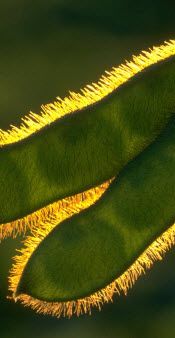
Seed filling requires water and nutrients. The plant redistributes nutrients to provide about half the nitrogen, potassium and phosphorus needs. The rest comes from N fixation and root uptake. At R5, the plant is less able to compensate for stresses. The seed is at least 1/8" long in 1 of the pods on the upper 4 nodes. Halfway through this stage, the plant reaches its maximum height, number of nodes and leaf area. N fixation peaks. Seeds accumulate dry weight.
Pests to Scout For:
R6 Stage: Full Seed
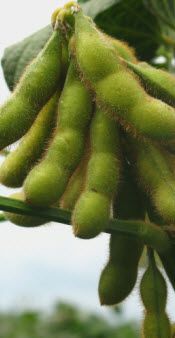
By R6, the “green bean” stage, total pod weight peaks. Seed growth is rapid. Leaves on the lowest nodes will start to yellow. Depending on weather senescence and leaf loss can be rapid.
Tips
- Cercospora Leaf Blight and Purple Seed Stain of Soybeans
- Managing Delayed or Frost-Damaged Soybeans
- Stink Bug Damage to Soybeans
Pests to Scout For:
R7 Stage: Beginning Maturity
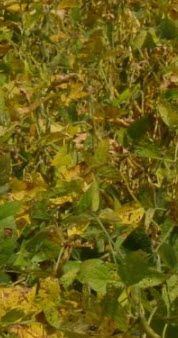
R7 begins when 1 normal pod on the main stem is mature in color (brown or tan). Dry matter is peaking in seeds. Green is disappearing, and both seeds and pods appear yellow. The seeds are 60% moisture at physical maturity. Stress has little effect unless pods are shattered or fall to the ground.
Tips
R8 Stage: Full Maturity
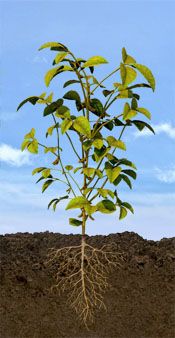
At R8 (full maturity), 95% of the pods are mature in color. From this stage, it takes only 5 to 20 days of good drying weather to get soybeans below 15% moisture, ideal for harvest. Growers should harvest soon to avoid losses.
Tips